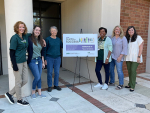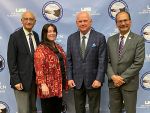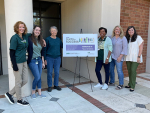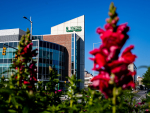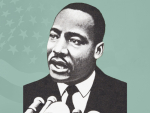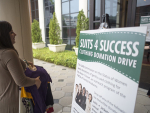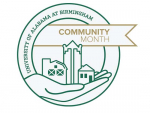Displaying items by tag: office of diversity equity and inclusion
Suits for Success supplies several tons of clothing not only to women but also to students and patients in need, empowering them to confidently avail employment opportunities and advance their careers.
Hip Hop Forum is one of UAB’s many events to celebrate Black History Month through education, outreach and engagement.
Tagged under
The Health Promoting University Presidents Panel was just one part of the larger U.S. Health Promoting Campuses Network Summit, which brought together over 170 participants from universities across the country.
Tagged under
Suits for Success’ impact transcends to three other UAB closets and a community closet serving students, patients and underprivileged women facing domestic violence.
Tagged under
Created in June 2015, the Okanagan Charter provides institutions with a common language, principles and framework to become health-promoting campuses with cultures of compassion, well-being and equity.
Tagged under
For the Commission on the Status of Women, Padma is a symbol of resilience and the ability to “rise above the surface and bloom daily.”
Tagged under
UAB Blazers will live the tenets of Creed Week by packing meals for the hungry, engaging in social justice discussions and more.
Tagged under
Black History Month at UAB brings everyone together for explorations of history, language and Gullah culture, and see “Black Is Beautiful,” Will Downing with Maysa, and Ranky Tanky.
Tagged under
Participate in UAB Community Month, attend a commemoration celebration Jan. 13 or volunteer for community outreach through MLK’s Beloved Community on Jan. 16.
Tagged under
Workplaces can be inclusive by knowing and educating employees about the different backgrounds of their colleagues and being mindful of differences.
Tagged under
For two decades, UAB’s SafeZone has been training and educating faculty, staff and students on LGBTQ+ identity and social justice.
Tagged under
This is the fifth consecutive year that UAB has been named a Diversity Champion and received the HEED award.
Tagged under
Academy Award-winner Davis will speak on her work to bring gender parity to entertainment, and sign copies of her new book, “Dying of Politeness,” at UAB’s Alys Stephens Center.
The Padma Award recognizes UAB faculty, staff and students who go the extra mile in support of underrepresented populations.
Tagged under
- release
- office of diversity equity and inclusion
- collat school of business
- department of marketing industrial distribution and economics
- college of arts and sciences
- department of mathematics
- school of medicine
- institute for human rights
- department of political science and public administration
- department of anthropology
- department of social work
Live HealthSmart Alabama has taken its signature keys — healthy eating, prevention and wellness, physical activity, and education — to create and implement initiatives at all levels within the institution.
Tagged under
- release
- live healthsmart
- school of medicine
- department of medicine
- division of preventive medicine
- grand challenge
- strategic plan
- school of health professions
- department of nutrition sciences
- campus recreation
- employee wellness
- student affairs
- student health and wellness
- office of the provost for student and faculty success
- office of diversity equity and inclusion
- facilities
- sustainability
- uab care
- minority health and health equity research center
The 2022 spring symposium will be held April 14 and will include speakers Jessie DeAro, Ph.D., and Devon W. Carbado, J.D.
Tagged under
Suits for Success provides work-appropriate attire to women through My Sister’s Closet. This year’s drive is March 24-25 on the UAB campus.
UAB’s Paulette Patterson Dilworth, Ph.D., will host a virtual conversation with LaGarrett King, Ph.D., discussing Black history on Wednesday, Feb 23.
Tagged under
Join UAB’s Kecia Thomas, Ph.D., for a conversation centered on women and marginalized individuals in academia and STEM-related fields.
The University of Alabama at Birmingham’s Office of Diversity, Equity and Inclusion is hosting the sixth annual Community Month.
